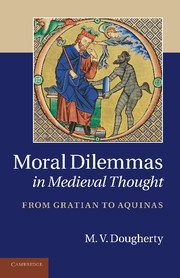Book contents
- Frontmatter
- Contents
- Preface
- Introduction
- 1 Gratian and his glossators on conflicts in the natural law
- 2 Twenty moral dilemmas from two early thirteenth-century summaries of theology: William of Auxerre's Summa aurea and the Franciscan Summa Halesiana
- 3 Raymond Lull and moral ensnarement in the Vita coaetanea
- 4 Thomas Aquinas, moral dilemmas, and a missing article from Quodlibet XII
- 5 Thomas Aquinas on failures of practical reasoning: Why synderesis doesn't inoculate agents against malformed conscience dilemmas
- 6 Moral dilemmas in the early Thomistic tradition: Johannes Capreolus and the Deceiving Demon Dilemma
- Conclusion
- Bibliography
- Index
5 - Thomas Aquinas on failures of practical reasoning: Why synderesis doesn't inoculate agents against malformed conscience dilemmas
Published online by Cambridge University Press: 03 May 2011
- Frontmatter
- Contents
- Preface
- Introduction
- 1 Gratian and his glossators on conflicts in the natural law
- 2 Twenty moral dilemmas from two early thirteenth-century summaries of theology: William of Auxerre's Summa aurea and the Franciscan Summa Halesiana
- 3 Raymond Lull and moral ensnarement in the Vita coaetanea
- 4 Thomas Aquinas, moral dilemmas, and a missing article from Quodlibet XII
- 5 Thomas Aquinas on failures of practical reasoning: Why synderesis doesn't inoculate agents against malformed conscience dilemmas
- 6 Moral dilemmas in the early Thomistic tradition: Johannes Capreolus and the Deceiving Demon Dilemma
- Conclusion
- Bibliography
- Index
Summary
Among the truths designated by Thomas Aquinas as self-evident (per se nota) belongs a class of propositions promoted as the foundation for ethical reasoning. Aquinas is confident that all agents possess at least a subset of these true propositions and regularly employ them in ethical decision-making. He identifies the production of such basic ethical propositions or first principles with the habit of synderesis. This habit of synderesis for practical reasoning is parallel to the habit of understanding (intellectus) for speculative reasoning, as both habits supply self-evident first principles for arguments in their respective domains. Synderesis supplies general truths as major premises for practical syllogizing, and intellectus does the same for theoretical or speculative syllogizing. While Aquinas's best-known example of a self-evident principle of practical reasoning, “good is to be done and pursued, and evil is to be avoided (bonum est faciendum et prosequendum, et malum vitandum),” is famously asserted in the discussion of natural law in the Summa theologiae and subject to much discussion among twentieth-century Thomistic commentators, it is not the one to which Aquinas gives the most analysis throughout his writings. Instead, the first principle of practical reasoning most extensively discussed by Aquinas is “The commandments of God are to be obeyed.” This principle, which for convenience can be referenced as the Divine Command Principle (hereafter, DCP), is defended in works throughout the span of Aquinas's writing career, yet it has largely been ignored by present-day commentators seeking to set forth Aquinas's philosophical ethics.
Information
- Type
- Chapter
- Information
- Moral Dilemmas in Medieval ThoughtFrom Gratian to Aquinas, pp. 147 - 167Publisher: Cambridge University PressPrint publication year: 2011
